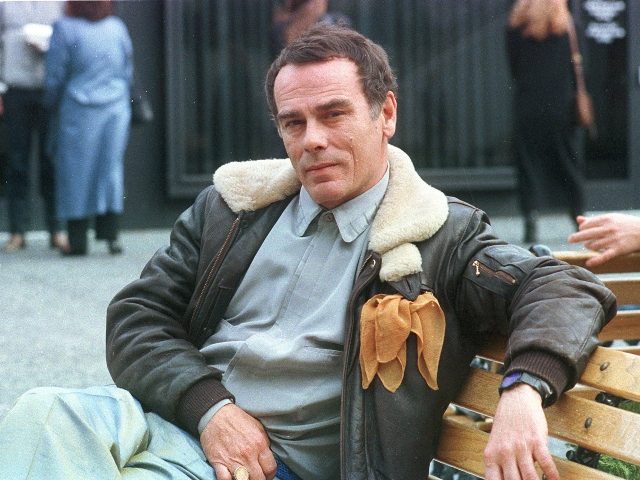Most of us discovered Dean Stockwell, who died last week at age 85, by way of the television series Quantum Leap (1989-1993), where he memorably portrayed Admiral Al Calavicci, a cigar-chomping horn dog and right-hand to Sam (series star Scott Bakula). Over 97 episodes, Stockwell showed up every week with that unmistakable gleam in his eye to help Sam fix American history and find his way home.
If you haven’t seen Quantum Leap, you should. It’s another one of those series more appreciated today than it was at the time. Bakula and Stockwell have killer chemistry, and the show itself is a fascinating mix of episodic and anthology. The formula is always the same, but like an anthology series, except for the two co-stars, the setting, era, and supporting cast and situation change every week.
If that’s not convincing enough, the Woke Nazis would hate Quantum Leap. It could never get made today, especially not with Stockwell’s “toxic male.”
Oh, boy.
By the time Stockwell joined Quantum Leap, he was 53-years-old, had just been nominated for an Oscar, and had been in show business for 44 years—reaching all the way back to the Thin Man series.
A remarkable child star — natural and never precious or precocious — through fits and starts and a few chosen sabbaticals, he carved out a remarkable 71-year career before retiring five years ago.
Here are Stockwell’s five best movies… He elevated everything he appeared in, but the following are great movies he made even better.
- The Boy with the Green Hair (1948)
Eleven-year-old Stockwell plays the title character, a war orphan ostracized from society over his natural green hair.
An obvious allegory touching on issues of racism and pacifism, the final fifteen minutes are a little heavy-handed, but Stockwell and director Joseph Losey make it worth your time because 1) it’s still a very original/odd film and 2) it avoids sentimentality.
4. Married to the Mob (1988)
Another one of those great late-80s comedies just dying to be rediscovered (ala Stakeout, Down and Out In Beverly Hills, Adventures In Babysitting, Tin Men, Summer School, Overboard, The ‘Burbs, etc.)
After her Mafioso husband (Alec Baldwin) dies, his wife Angela (an excellent Michelle Pfeiffer) decides she wants out of the life. Unfortunately, Tony “The Tiger” Russo (Stockwell) has his eye on her.
This is the one that earned Stockwell that Oscar nomination, and he absolutely sparkles among a terrific cast (Mercedes Ruehl, Joan Cusack, Oliver Platt). Tony “The Tiger” is equal parts menacing, sympathetic, ruthless, clumsy, and laugh-out-loud hilarious.
- Paris, Texas (1984)
If you want to appreciate Stockwell’s vast range, watch Married to the Mob and this one back-to-back.
Although Wim Wenders’ indie masterpiece is really Harry Dean Stanton’s movie, Stockwell is dynamite as Stanton’s younger brother Walt, a decent everyman living in Los Angeles and forced to deal with a brother so haunted by his past, he can hardly function.
- Blue Velvet (1986)
In the history of standout, single-scene performances, there are many greats but no equals. As Ben, Stockwell was handed the most challenging job in the world by director David Lynch. Not only did the audience have to believe Dennis Hopper would accept Ben as his underworld boss, we had to believe Dennis Hopper’s Frank Booth, one of the most terrifying villains in movie history, could be out-weirded, intimidated, and even a little in love with Ben.
What Stockwell pulls off here is nothing short of a miracle, pure movie magic, a scene for the ages.
- Compulsion (1959)
Director Richard Fleischer’s fictional retelling of the infamous Leopold and Loeb murder and subsequent trial outshines all others by a mile, including Hitchcock’s superb Rope.
Stockwell plays Jonathan (the Leopold character), the “brains” behind one of the most heinous crimes in American history, one so awful the motive still shocks. To prove they’re superior to a point where law and morality have no meaning, Stockwell convinces Artie (Bradford Dillman) to kidnap and murder a child.
This is 1959, so obviously, the homosexual element is all in the subtext, but that’s where Stockwell lifts the story into the ether. Without mincing or in any way overtly telegraphing his sexuality, through looks and voice inflection, Stockwell plays the equivalent of a femme fatale leading a weak and infatuated man to his doom.
What really sells it, though, what makes Stockwell’s character so complicated, intriguing, and even tragic, is that, unlike a femme fatale, Jonathan’s actually in love with Artie. His motive goes beyond seeing himself as Nietzsche’s Superman. Because he lives in an unjust society that won’t allow two men to live together as lovers, he knows he’ll soon lose Artie to heterosexual respectability. This terrible crime, then, is a way to bind the two men forever together. You see, it’s all Jonathan has to hold on to the man he loves, and none of that tragedy is written on the page. It’s all in Stockwell’s performance, which makes Compulsion an appreciated but still underrated classic.
—
Like his contemporary and close friend Dennis Hopper, Stockwell made his bones during Hollywood’s Golden Era and went on to enjoy a decades-long career as a dynamic, ever-competent, and welcome presence in whatever he appeared in. An actor with enormous range and depth, we probably took him a little for granted because he was one of those guys who was always around.
Seventy-one years Dean Stockwell gave us, and it still wasn’t enough.
To paraphrase the immortal Frank Booth… Here’s to your fuck, Dean.
Honorable mentions: Anchors Aweigh (1945), Gentleman’s Agreement (1947), The Secret Garden (1949), Long Day’s Journey Into Night (1962), To Live and Die In L.A. (1985), The Player (1992), and Air Force One (1997).
Follow John Nolte on Twitter @NolteNC. Follow his Facebook Page here.

COMMENTS
Please let us know if you're having issues with commenting.